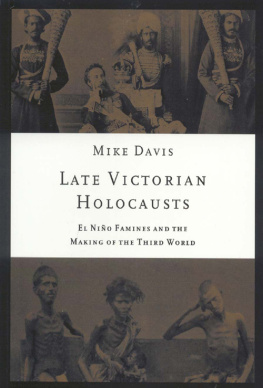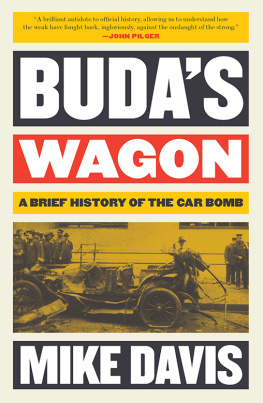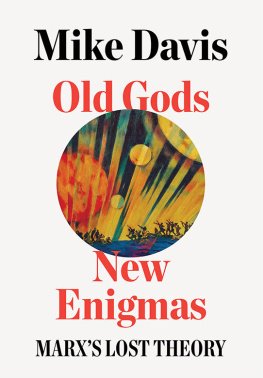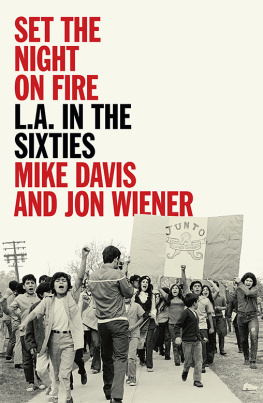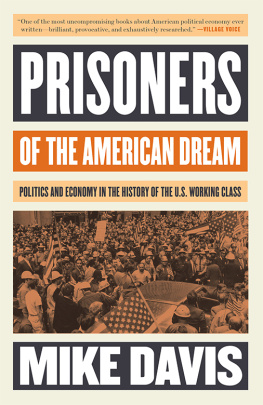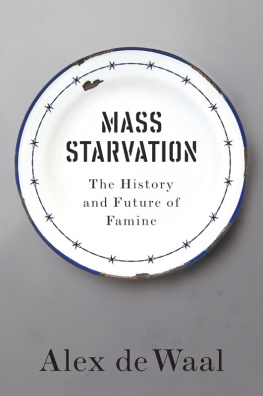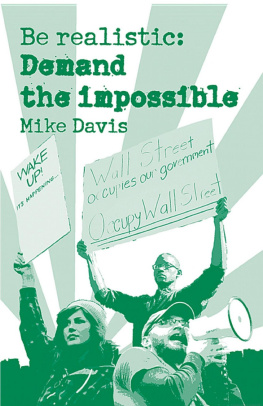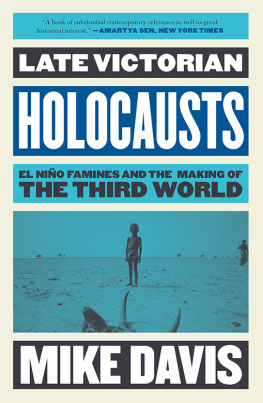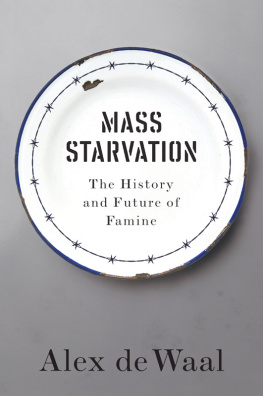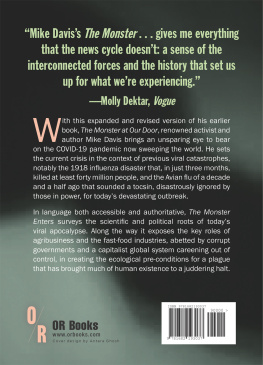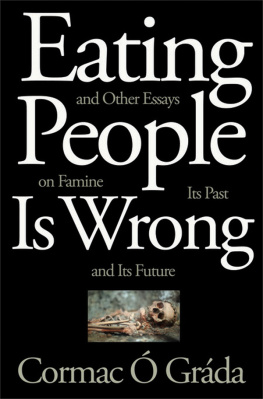Late Victorian Holocausts

Late Victorian Holocausts
El Nio Famines and the Making
of the Third World

MIKE DAVIS

First published by Verso 2001
Copyright 2001 Mike Davis
All rights reserved
The moral rights of the author have been asserted
Verso
UK: 6 Meard Street, London W1V 3HR
US: 20 Jay Street, Suite 1010, Brooklyn, NY 11201
Verso is the imprint of New Left Books
eISBN 978-1-78168-061-2
British Library Cataloguing in Publication Data
A catalogue record for this book is available from the British Library
Library of Congress Cataloging-in-Publication Data
A catalog record for this book is available from the Library of Congress
Designed and typeset by Steven Hiatt
San Francisco, California
Printed and bound in the USA by R. R. Donnelly & Sons
Offended Lands
It is so much, so many tombs, so much martyrdom, so much galloping of beasts in the star! Nothing, not even victory will erase the terrible hollow of the blood: nothing, neither the sea, nor the passage of sand and time, nor the geranium flaming upon the grave.
Pablo Neruda (1937)
Acknowledgements
An ancient interest in climate history was rekindled during the week I spent as a fly on the wall at the June 1998 Chapman Conference, Mechanism of Millennial-Scale Global Climate Change, in Snowbird, Utah. Listening to the folks who mine environmental history from the Greenland Ice Sheet and the Bermuda Rise discuss state-of-the-art research on climate oscillations was a truly exhilarating experience, and I thank the organizers for allowing a mere historian to kibitz what was intended to be a family conversation.
The outline for this book was subsequently presented as a paper in September 1998 at the conference Environmental Violence organized at UC Berkeley by Nancy Peluso and Michael Watts. Vinayak Chaturvedi, Tom Brass and Gopal Balakrishnan generously offered expert and luminous criticisms of this project in its early stages. Kurt Cuffey spruced up some of the physics in . Dan Monk and Sara Lipton, Michelle Huang and Chi-She Li, and Steve and Cheryl Murakami provided the essential aloha. The truly hard work was done by Steve Hiatt, Colin Robinson, Jane Hindle and my other colleagues at Verso Books, while David Deis created the excellent maps and graphics and Tom Hassett proofread the galleys with care. A MacArthur Fellowship provided unencumbered opportunities for research and writing.
The real windfalls in my life, however, have been the sturdy love and patience of my compaera, Alessandra Moctezuma; the unceasing delight of my children, Jack and Roisn; and the friendship of two incomparable rogue-intellectuals and raconteurs, David Reid and Mike Sprinker. David took precious time off from 1940s New York to help weed my final draft. Mike introduced me to the impressive work of South Asian Marxist historians and provided a decisively important critique of the books original conception. His death from a heart attack in August 1999, after a long and apparently successful fight against cancer, was simply an obscenity. He was one of the genuinely great souls of the American Left. As Jos Mart once said of Wendell Phillips: He was implacable and fiery, as are all tender men who love justice. I dedicate this book to his beloved wife and co-thinker, Modhumita Roy, and thank her for the courage she has shared with all of us.
Preface
The failure of the monsoons through the years from 1876 to 1879 resulted in an unusually severe drought over much of Asia. The impact of the drought on the agricultural society of the time was immense. So far as is known, the famine that ravished the region is the worst ever to afflict the human species.
John Hidore, Global Environmental Change
It was the most famous and perhaps longest family vacation in American history. Under a crescendo of criticism for the corruption of his administration, the newly retired president of the United States, Ulysses S. Grant, his wife Julia, and son Jesse left Philadelphia in spring 1877 for Europe. The ostensible purpose of the trip was to spend some time with daughter Nellie in England, who was married (after the fashion that Henry James would celebrate) to a dissolute English gentleman. Poor Nellie, in fact, saw little of her publicity-hungry parents, who preferred red carpets, cheering throngs and state banquets. As one of Grants biographers has put it, much has been said about how Grant, the simple fellow, manfully endured adulation because it was his duty to do so. This is nonsense. Folks back home were thrilled by New York Herald journalist John Russell Youngs accounts of the stupendous dinners, with food and wine in enormous quantity
Wherever they supped, the Grants left a legendary trail of gaucheries. In Venice, the General told the descendants of the Doges that it would be a fine city if they drained it, while at a banquet in Buckingham Palace, when the visibly uncomfortable Queen Victoria (horrified at a tantrum by son Jesse) invoked her fatiguing duties as an excuse to escape the Grants, Julia responded: Yes, I can imagine them: I too have been the wife of a great ruler. In Berlin, the Grants hovered around the fringes of the great Congress of Powers as it grappled with the Eastern Question as a prelude to the final European assault on the uncolonized peoples of Africa, Asia and Oceania. Perhaps it was the intoxication of so much imperialist hyperbole or the vision of even more magnificent receptions in oriental palaces that prompted the Grants to transform their vacation into a world tour. With James Gordon Bennett Jr. of the New York Herald paying the bar tab and the US Navy providing much of the transportation, the exFirst Family plotted an itinerary that would have humbled Alexander the Great: up the Nile to Thebes in Upper Egypt, back to Palestine, then on to Italy and Spain, back to the Suez Canal, outward to Aden, India, Burma, Vietnam, China and Japan, and, finally, across the Pacific to California.
Vacationing in Famine Land
Americans were particularly enthralled by the idea of their Ulysses in the land of the pharaohs. Steaming up the Nile, with a well-thumbed copy of Mark Twains Innocents Abroad on his lap, Grant was bemused to be welcomed in village after village as the King of America. He spent quiet afternoons on the river reminiscing to Young (and thousands of his readers) about the bloody road from Vicksburg to Appomattox. Once he chastised the younger officers in his party for taking unsporting potshots at stray cranes and pelicans. (He sarcastically suggested they might as well go ashore and shoot some poor, patient drudging camel, who pulls his heavy-laden hump along the bank.) On another occasion, when their little steamer had to pull up for the night while the crew fixed the
Indeed the Grants idyll was soon broken by the increasingly grim conditions along the river banks. Our journey, reported Young, was through a country that in a better time must have been a garden; but the Nile not having risen this year all is parched and barren. Although so far the Grants had only basked in the warmth of peasant hospitality, there had been widespread rioting in the area south of Siout (capital of Upper Egypt) and some of the

